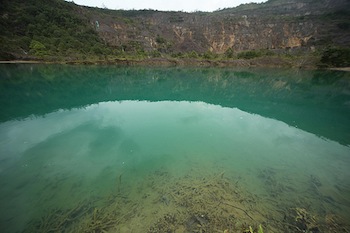Troubled Waters in Papua New Guinea

In our Troubled Waters report, we detailed the egregious but routine practice of mining companies dumping mine waste in rivers, lakes and other water bodies, particularly in the developing world.
Here's what we found:
Mining companies are dumping more than 180 million tonnes of hazardous mine waste each year into rivers, lakes, and oceans worldwide, threatening vital bodies of water with toxic heavy metals and other chemicals poisonous to humans and wildlife. Mine processing wastes, also known as tailings, can contain as many as three dozen dangerous chemicals including arsenic, lead, mercury and processing chemicals such as petroleum byproducts, acids and cyanide. The dumping of mine tailings and waste rock pollutes waters around the world, threatening the drinking water, food supply and health of communities as well as aquatic life and ecosystems.
One example is the Ramu Nickel mine in Papa New Guinea. In 2011 the mine, operated by two Chinese and Australian companies, sought and won the authority to dump 5 million tons of mine waste annually into the Basumak Bay of the Bismarck Sea, a coastal area rich in biodiversity. (Check out our photo stream on the mine, which shows just what millions of tons of river dumping looks like.)
Local landowners tried to challenge this ruling, filing a lawsuit against the companies to halt the dumping. But the PNG Supreme Court ruled in favor of the companies, ensuring the continued dumping of mine waste into water bodies without the most routine of precautions.
In the same area, Marengo Mining of Australia has proposed a copper-gold mine near the Ramu Nickel site that would also dump tailings into Astrolabe Bay at a rate potentially five times that of the Ramu mine. The company is planning for the Yandera mine to begin operating in 2015.
Still, there is room for optimism in PNG. Last month, the country's Constitutional Law Reform Commission, an independent accountability body, announced an "inquiry" into waste dumping practices, and the health and environmental impacts of several mines in the area, including the Ramu nickel mine. According to the Australian, "The Commission’s secretary Dr Eric Kwa says the inquiry will put the spotlight on the PNG mining industry and its regulation of waste tailings as there is currently no framework in place."
This move by the government is a step in the right direction. Mining companies should not dump toxic-laden waste into water bodies anywhere in the world. As PNG examines the practices of mining companies operating there, we hope it and other countries pass legislation that holds mining companies accountable and protects water for their citizens.
For more information:
- Troubled Waters: How Mine Waste Dumping is Poisoning Our Ocean, Rivers, and Lakes
- Papua New Guinea Mine Watch blog
Tagged with: water pollution, tailings, papua new guinea, mining
comments powered by Disqus
Follow Earthworks